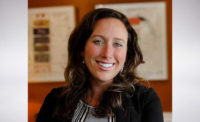Name/Title/Company: Sumayyah Theron, director of sustainability, Cyclone Energy Group
Age: 43
Educational Experience: Bachelor’s degree in architectural engineering from Jordan University of Science and Technology, and a master’s degree in energy and sustainable building design from De Montfort University in Leicester, U.K.
Professional Credentials/Accreditations: Engineer in Training (EIT), WELL Accredited Professional (WELL AP), WELL Performance Testing Agent, Green Building Initiative (GBI) Green Globes Professional (GGP), Green Globes (GG) Fellow, and fitwel Ambassador
Organizational Affiliations/Achievements/Awards: ASHRAE, Illinois Green Alliance (ILGA), GBI, Association of Energy Engineers (AEE)
What does your day-to-day job entail?
As the director of sustainability at Cyclone Energy Group, my day is a blend of strategy, leadership, and hands-on work. I oversee the implementation of sustainability and healthy building services for our clients, ensuring their projects are aligned with the highest green building standards. This includes regular consultations, overseeing the progress of various projects, coordinating with different teams, and staying updated on the latest advancements in sustainable building practices. Furthermore, guiding clients through the certification processes like Leadership in Energy and Environmental Design (LEED), WELL, Fitwel, and GG is a significant aspect of my daily responsibilities.
What caused you to/when did you fall in love with engineering?
My fascination with engineering began during my undergraduate years at the Jordan University of Science and Technology. I was always intrigued by the synthesis of form and function in architecture. But, it was the challenge of creating structures that are not only aesthetically pleasing but also environmentally responsible and sustainable that truly captured my passion. The idea of shaping our surroundings in a manner that positively impacts both the environment and its inhabitants was both inspiring and motivating.
What has been the most rewarding/proudest aspect of your engineering career?
The most rewarding aspect of my career has been the tangible impact of my work on creating healthier, more sustainable spaces. Every time a building I've consulted on achieves a Green Building Certification, it's a testament to our collective effort to push the boundaries of what's possible in sustainable engineering. Knowing that my expertise contributes to structures that are better for the environment and enhance the well-being of their occupants fills me with immense pride and drives me to continue innovating in this field.
What challenges do women face in this profession? Can you give a personal example? Why aren’t there more women in engineering? How can we increase the number of women in engineering?
The engineering field, like many STEM fields, has historically been male-dominated. Women often face challenges ranging from biases and stereotypes to a lack of representation and mentorship. Personally, I've encountered instances where my expertise was questioned simply because of my gender. Early in my career, during a meeting, a male colleague insinuated that my architectural suggestions were merely 'aesthetic' and lacked technical depth, despite my strong educational and practical background.
The scarcity of women in engineering can be attributed to societal perceptions; lack of female role models in the sector; and, sometimes, discouragement from pursuing what's seen as a “male profession.” However, the trend is changing, as seen by the increase in women obtaining degrees in engineering and computer science.
To boost the number of women in engineering, we must:
- Promote STEM education for girls from a young age, fostering a love for science and mathematics;
- Showcase successful female engineers as role models, so young girls can envision a future in the field;
- Offer mentorship programs specifically tailored to support women in engineering; and
- Encourage companies to adopt inclusive hiring practices and cultivate work environments that support diversity and equality.
By addressing these areas, we can continue the positive trend of more women embracing and thriving in engineering careers.
How many years have you been active in the engineering sector? What’s changed the most in that time? What’s changed the least?
I've been active in the engineering sector for more than 20 years. The most significant change I've observed during this time is the emphasis on sustainability and environmental responsibility. When I started, green building practices were niche; today, they are almost standard, driven by a global awareness of our ecological footprint. Another notable shift has been the integration of technology and data analytics in enhancing building efficiency. What's changed the least is the foundational importance of safety and integrity in engineering designs, irrespective of the scale or nature of a project.
You’ve designed buildings that meet or exceed various green building certifications, including LEED, WELL, Fitwel, and Green Globes. Share the advantages of working on a project that involves such benchmarks.
Working on projects aiming for green building certifications offers multiple advantages. First, it ensures the building will have a reduced environmental footprint, conserving resources and minimizing waste. Secondly, these benchmarks set a high standard for indoor environmental quality, meaning the occupants will benefit from healthier indoor air, better lighting, and overall improved well-being. On a personal level, aiming for these certifications challenges me to stay updated with the latest sustainable practices and technologies, ensuring continuous professional growth. Lastly, buildings that achieve these certifications often result in cost savings for owners in the long run due to energy efficiency and reduced resource consumption.
You worked as an architect and building energy analyst in Jordan and South Africa. How does engineering differ from country to country?
Engineering practices often reflect the unique socio-economic, cultural, and environmental context of each country. In Jordan, with its arid climate and historical architecture, the focus was more on sustainable materials and passive cooling techniques. South Africa, with its diverse climate zones, presented challenges in ensuring designs were suitable for varying conditions. Additionally, regulations, building codes, and available resources differ from country to country. However, the foundational principles of engineering and the commitment to creating safe, efficient, and sustainable structures remain consistent globally.
What drives/motivates you every day?
Every day, I'm driven by the vision of creating spaces that not only serve their primary function but also enhance the well-being of their occupants and have minimal impact on our environment. The knowledge that my work directly contributes to a more sustainable future, where buildings harmonize with nature, keeps me motivated and passionate about what I do.
What remains on your engineering bucket list — what do you aspire to do that you haven’t accomplished yet?
On my engineering bucket list, I aspire to lead a project that sets a new global standard for sustainability, becoming a benchmark for future constructions. I envision a building that seamlessly integrates renewable energy, innovative water conservation techniques, and materials that are not just eco-friendly but also regenerative.
What’s one thing no one knows about you?
Many are unaware of my childhood dream of becoming an astronaut. My fascination with the cosmos was so profound that I corresponded with NASA and was a part of their kids' club. Not only was I passionate about understanding the vast expanse of the universe, but I also excelled in physics and had an extensive collection of constellation maps. Those early aspirations might not have taken me to space, but they certainly grounded the foundation for my analytical thinking and desire to explore uncharted territories, even here on Earth.
Have you had any mentors who’ve helped you succeed and how have they shaped your success?
Throughout my career, I've largely navigated the complexities of the engineering world on my own. While I haven’t had the traditional mentor-mentee relationships that many others benefit from, my experiences, challenges, and the diverse professionals I've worked alongside have collectively shaped my approach and understanding of the field. Every project, challenge, and success has been a learning opportunity, teaching me resilience, adaptability, and innovation.





